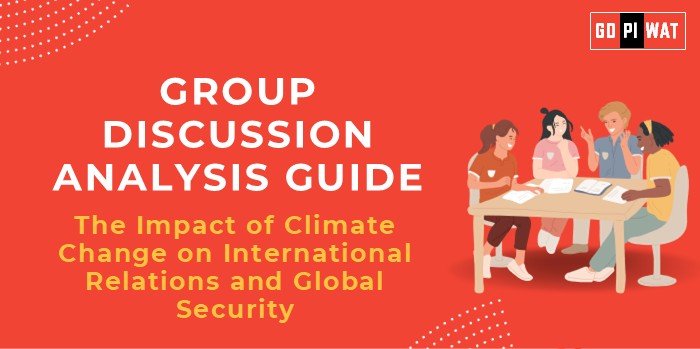📋 Group Discussion Analysis Guide: The Impact of Climate Change on International Relations and Global Security
🌐 Introduction to Climate Change and Global Security
📖 Context Setting
Climate change has transcended environmental boundaries, becoming a crucial geopolitical issue affecting international relations and global security. Rising sea levels, resource scarcity, and mass migrations are reshaping diplomatic priorities and alliances.
📜 Topic Background
The recognition of climate change as a “threat multiplier” dates back to 2007 when the UN Security Council debated its security implications. In recent years, events like COP28 and the Paris Agreement have highlighted global efforts to mitigate its impact.
📊 Quick Facts and Key Statistics
- 🌡️ Global Temperature Rise: 1.1°C above pre-industrial levels – Highlighting the urgency of global mitigation efforts (Source: IPCC 2023).
- 🌍 Climate-Induced Displacements: 21.5 million people displaced annually (UNHCR) – Underscoring migration challenges.
- 💰 Financial Impact: $2.5 trillion in economic losses expected by 2050 if current trends persist (World Bank).
- 💨 Carbon Emitters: China, USA, and EU account for over 50% of global emissions – Reflecting unequal responsibilities and capacities.
🤝 Stakeholders and Their Roles
- 🏛️ Governments: Implement climate policies, negotiate international treaties.
- 🏢 Multinational Corporations: Transition to sustainable practices; contribute to emissions.
- 📢 NGOs and Advocacy Groups: Raise awareness and hold stakeholders accountable.
- 🌐 International Organizations (UN, IPCC): Facilitate agreements and provide research.
- 👥 Citizens: Push for accountability and adopt sustainable practices.
🏆 Achievements and Challenges
✨ Achievements
- 🌍 Paris Agreement (2015): A landmark in collective global action.
- 🌱 EU Green Deal: Commitment to carbon neutrality by 2050.
- 💡 Renewable Energy Adoption: Solar and wind power seeing exponential growth.
⚠️ Challenges
- ⚖️ Political Resistance: Resistance in key nations (e.g., USA’s withdrawal under a former administration).
- 💰 Inequitable Financial Burdens: Developing nations face disproportionate challenges.
- 🌍 Rising Climate Migration: Fuels geopolitical tensions.
🌍 Global Comparisons
- ✅ Success: Norway achieving near 100% renewable energy.
- ⚠️ Struggles: Pacific Island nations facing existential threats.
📖 Case Studies
- 🌱 Bangladesh: Adaptation strategies using floating agriculture.
💡 Structured Arguments for Discussion
- 🛠️ Supporting Stance: “Climate change is the most significant global security challenge, as it intensifies resource conflicts and accelerates migration crises.”
- 🛡️ Opposing Stance: “Security risks from climate change are exaggerated compared to immediate geopolitical concerns like cyber threats.”
- ⚖️ Balanced Perspective: “While climate change poses undeniable security risks, its impact varies by region, requiring tailored solutions.”
🎯 Effective Discussion Approaches
🔑 Opening Approaches
- 📊 Statistic-Based: “With 21.5 million displaced annually, climate change is reshaping global demographics.”
- 📖 Case-Based: “Bangladesh’s adaptation exemplifies resilience, but many nations lack similar resources.”
⚙️ Counter-Argument Handling
- 🔄 Example: “While cyber threats are immediate, climate change’s long-term impacts are far more destabilizing.”
🧠 Strategic Analysis of Strengths and Weaknesses
SWOT Analysis:
- 💪 Strengths: Global agreements, renewable energy advancements.
- 🛠️ Weaknesses: Slow policy implementation, financial inequities.
- 🌟 Opportunities: Leadership in green technology.
- ⚠️ Threats: Resource conflicts, migration crises.
🏫 Connecting with B-School Applications
📚 Real-World Applications
- 🌍 Analyze financial models for green infrastructure.
- 📊 Assess geopolitical risks in operations.
🎓 Sample Interview Questions
- ❓ “How can businesses contribute to mitigating climate change’s impact on security?”
- ❓ “Discuss the role of technology in addressing climate-induced challenges.”
💡 Insights for B-School Students
- 📈 Study sustainable business models.
- 💰 Explore carbon trading mechanisms for global finance.


